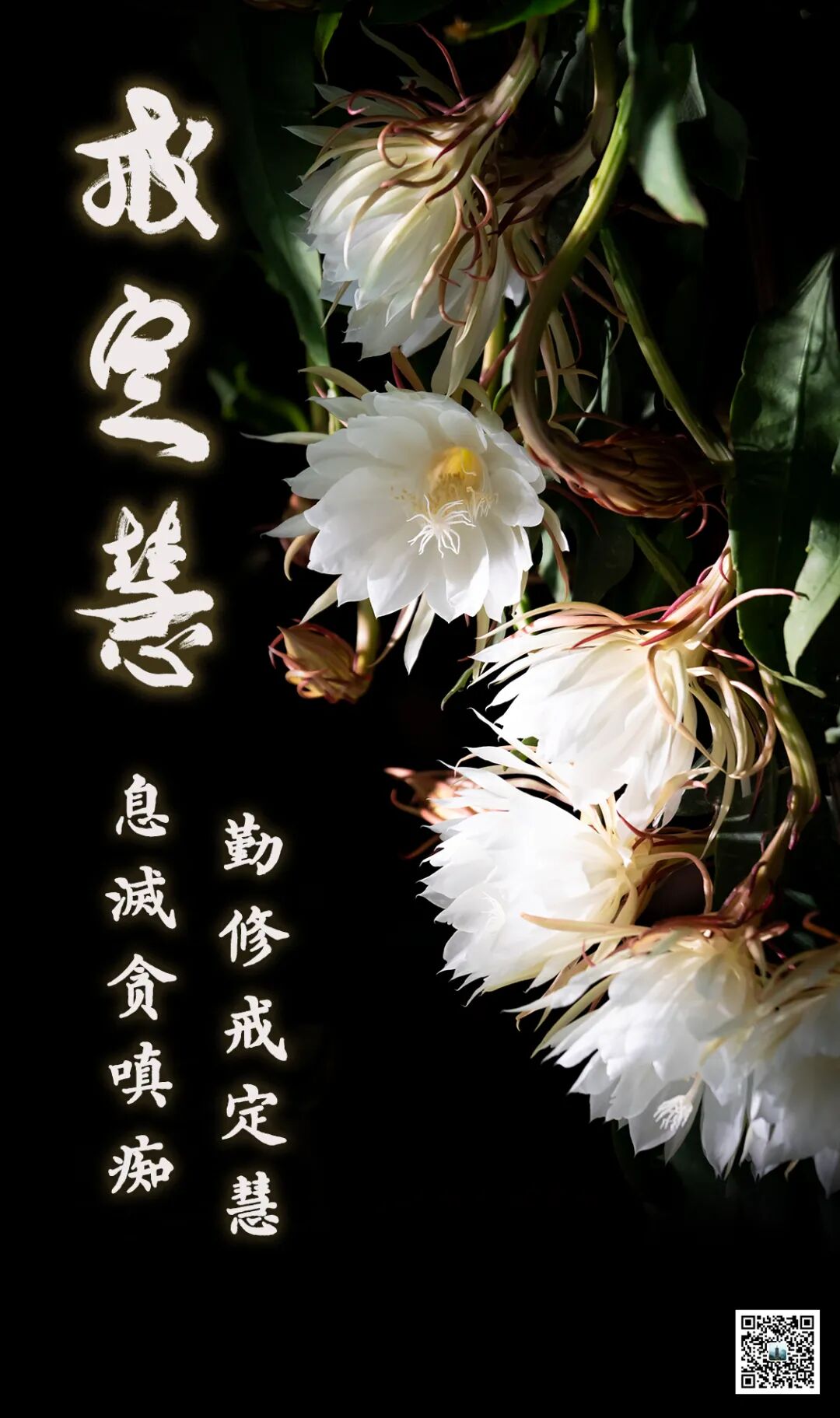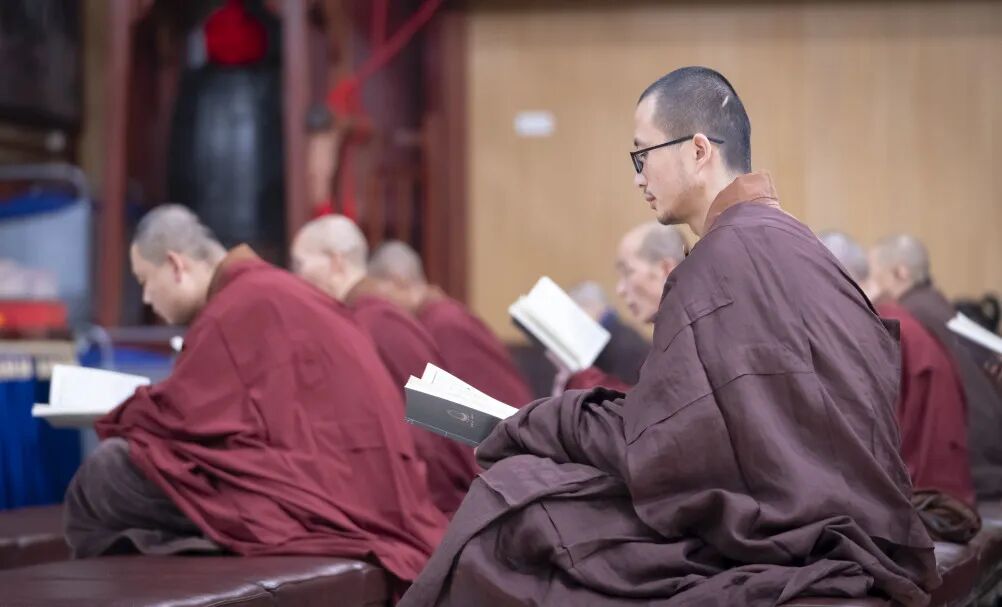如何正面建设心灵?




点击收听英文朗诵

怎样把心平静下来,
怎样用上功,
怎样建立戒定慧的三无漏功德?
How to calm the mind,
apply our effort in practice,
and establish the
three undefiled virtues
of precepts, samadhi, and wisdom?

息灭贪嗔痴
勤修戒定慧


现在我们的神识在身体里,我们会觉得这个身体就是我,而神识一旦离开了身体,就会认为我是独立的,那个身体不是我。
当临命终时,人会真真切切地感受到业力,此生的、生生世世的、自己的、家族的业力都会现前,有句话叫“阴境若现前,瞥尔随他去”,这个时候人很容易就随业流转了。
我们这一辈子,能积累多少福禄寿的资粮呢?我们平时都是消耗的模式,都是福禄寿的消费者。学佛了之后,要怎样把心平静下来,怎样用上功,怎样建立戒定慧的三无漏功德?
我们要不断听经闻法、息除烦恼,消灭贪嗔痴,勤修戒定慧,找回本心,让心灵越来越宁静、越来越干净。要在心灵上有正面的建设,把过去的业力清除,把心里面的垃圾清扫干净,把已有的罪业灭掉,把没有的功德建立起来。

深入经藏 智慧如海


现在还有三宝这个平台是不容易的,三宝还常住在世间,我们还有机会来亲近,还有机会来闻思生命的最高课题,然后还能去实践,这是多么稀有难得啊。我们每天听经闻法,心就会越来越清楚。佛法里有甚深的智慧,我们要深入经藏,才能智慧如海。
佛陀在《长阿含经》中告诉我们,修行人有七种成就之法,这七种成就之法也叫“七圣财”,又称作是修行人的“七法财”,即信财、戒财、惭财、愧财、闻财、施财、慧财。以其所持之法能资助成佛,故称为“财”。世间的财富我们带不走,但这七种圣法财却能够生生世世利益我们,直至我们的生命得到圆满,永离苦海回归本性。
我们要具足七圣财。七圣财其实只是为了我们成就铺路的,有了七圣财之后,还要逐步地进入七贤位。我们坐在这里打坐,能够身心放松、万缘放下,得一点轻安,能够现前一点定的功德,这才是七贤位里的一点点相,道的边我们才沾到一点。
从小乘来说,暖位、顶位、忍位,这都属于七贤位中的一部分,后面还有七圣位。所以我们修行,要层层递进,不能得少为足,也不能模糊、宽泛地认为我有信仰了,信仰是有具体实践内容的。在小乘和大乘里,七贤位、七圣位具体指的内容不一样。天台宗的藏、通、别、圆四教里,藏教、通教、别教和圆教的七贤位内容是不一样的,这都是需要我们全身心去学习、实践的。

共善业的力量

我们每天最宝贵的时间就是晚上大家一起闻思、念佛、打坐。哪怕打坐只有五分钟、十分钟,但是我们一起的共善力,那是不得了的。平时自己打坐没有这么好的效果的,但是大家一起打坐五分钟效果都会很好。这就是大乘僧团共善业的加持力。

ENGLISH
向上滑动阅览完整英语翻译
Cease greed, anger, and ignorance; diligently cultivate precepts, samadhi, and wisdom.
At present, our consciousness resides within the body, so we perceive this body as the self. Once consciousness departs from the body, it will regard itself as independent, and that body will no longer be seen as “me.”
At the moment of death, one will vividly experience the power of karma — karma from this life, from past lives, one’s own karma, and that of one’s family will all manifest. As the saying goes, “When the scenes of the netherworld appear, one follows them in a flash.” At that time, it is very easy for one to be carried away by the flow of karma.
In this lifetime, how much of the blessings of fortune, prosperity, and longevity can we accumulate? Usually, we live in a mode of consumption — consumers of these blessings. After learning the Buddha’s teachings, we must learn how to calm the mind, apply our effort in practice, and establish the three undefiled virtues of precepts, samadhi, and wisdom.
We must continually listen to and contemplate the Dharma, extinguish afflictions, eliminate greed, anger, and ignorance, and diligently cultivate precepts, samadhi, and wisdom. In doing so, we rediscover our original mind, allowing it to become ever more tranquil and pure. We must construct the positive foundation of the mind, purify the karmic obstacles of the past, clear away the impurities within, eradicate the sins that already exist, and establish virtues that have not yet arisen.
Delve deeply into the Buddhist scriptures, and wisdom as vast as the sea will arise.
For humankind to still have access to the platform of the Triple Gem is no easy feat. The Triple Gem still abide in the world, and we still have the opportunity to draw near to them, to hear and contemplate the highest truths of life, and to put them into practice. How rare and precious this is! By listening to the Dharma daily, our minds become increasingly clear. Profound wisdom lies within the Buddha’s teachings; only by deep contemplation of the sutras, can our wisdom become as boundless as the sea.
In the Dīrgha Āgama Sūtra, the Buddha teaches that practitioners have seven means of accomplishment, known as the “Seven Noble Treasures,” or the “Seven Treasures of the Path.” These are: the treasure of faith, the treasure of precepts, the treasure of shame, the treasure of remorse, the treasure of learning, the treasure of generosity, and the treasure of wisdom. Because these treasures support the attainment of Buddhahood, they are called “treasures.” The wealth of the world cannot be taken with us, but these Seven Noble Treasures will benefit us in each and every lifetime, until our existence reaches perfection, forever freed from suffering and returning to our true nature.
We must be endowed with these Seven Noble Treasures. Yet they only pave the way toward attainment. Once we possess them, we must gradually advance toward the stage of the Seven Worthies. When we sit in meditation, relax the body and mind, let go of all attachments, and attain a sense of lightness and peace — that is a glimpse of the merit of concentration, a trace of entry into the path, touching merely the edge of it.
From the perspective of the Hīnayāna teachings, the stages of Warmth, Summit, and Patience all belong to the Seven Worthies. Beyond that are the Seven Holy Stages. Therefore, in cultivation we must advance step by step, never being content with a little advance, nor vaguely thinking that mere faith is sufficient — for faith entails concrete practice. In both Hīnayāna and Mahāyāna teachings, the specific meanings of the Seven Worthies and Seven Holy Stages differ. Within the Tiantai school’s Four Teachings — the Store, the Common, the Distinct, and the Perfect — the content of the Seven Worthies also differs. All of this requires our wholehearted study and diligent practice.
The Power of Collective Virtue
The most precious time of our day is in the evening, when everyone gathers to listen, contemplate, recite, and meditate together. Even if the meditation lasts only five or ten minutes, the power of our shared virtue is immense. The effect far surpasses that of meditating alone, for when we practice together, even for five minutes, the results are remarkable. This is the empowering force of the collective merit in a great Mahāyāna community.
英文翻译:妙莲
英文朗诵:贤迦


- 相关文章
- · 谛闲大师 | 其心珍重,切莫浪用
- · 在修行上越本分、越传统越好
- · 世间为亭,佛法如桥
- · 真正的开光,是学会“开心”
- · 十一月 | 云闲高碧,日暖如春
- · 入林入草不曾停 | 虚云老和尚圆寂纪念日
- · 谛闲大师 | 如何习观?
- · 修行,要舍得让自己吃苦
- · 谛闲大师 | 念佛与修观
- · 慈与悲的含义,很深很深
- · 又到九九重阳日 || 登高望远、缅怀先祖
- · 恭迎摩利支天菩萨圣诞 | 这位菩萨,亦是观世音菩萨的变化相
- · 做佛法上等根器的人
- · 要束缚还是自由,选择很重要
- · 谛闲大师 | 复金益平居士书(二)
- · 没有菩萨情怀,不会了解众生的苦难
- · 谛闲大师 | 这几种恩,需先识得
- · 中秋圆满|与你共赴,中国人那轮最美的“月圆”
- · 中秋佳节,恭迎月光菩萨圣诞〡月光遍照处,诸事尽圆满
- · 中秋 恭迎月光菩萨圣诞 | 月映千江,光照正觉